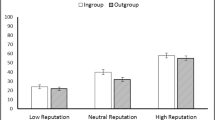Abstract
This study examined the difference in Japanese people’s recognition of Japanese and foreigners through trust game experiments with Japanese and international university students. Participants mentioned their birthplaces at the beginning of the game. Other demographic characteristics, such as gender and faculty, were also declared and used as control variables. All international students were assigned as trustors and Japanese students were randomly assigned as trustors or trustees. The experimental results revealed that: First, the level of trustworthiness did not significantly differ between Japanese and foreign international students. Second, Japanese students have significantly higher unconditional reciprocity for international students than for Japanese students. Third, the level of conditional reciprocity is not significantly different. This result suggests that being reserved may show the closed-mindedness of Japanese people toward foreigners.


Similar content being viewed by others
Data availability
The data supporting the results of this study are available upon request from the corresponding author, Tetsuya Kawamura.
Notes
Here, “foreign” and “foreigners” are represented from Japanese people's perspective.
Trustees decide whether they take all the transfer or return a half of it in Takahashi et al. (2008). It is possible that because the trustees were given only the completely selfish and completely fair choices, finding significant results may have been difficult.
References
Akai, K., & Netzer, R. J. (2012). Trust and reciprocity among international groups: Experimental evidence from Austria and Japan. The Journal of Socio-Economics, 41(2), 266–276.
Berg, J., Dickhaut, J., & McCabe, K. (1995). Trust, reciprocity, and social history. Games and Economic Behavior, 10(1), 122–142.
Casari, M., & Cason, T. N. (2009). The strategy method lowers measured trustworthy behavior. Economics Letters, 103(3), 157–159.
Fischbacher, U. (2007). z-Tree: Zurich toolbox for ready-made economic experiments. Experimental Economics, 10(2), 171–178.
Fershtman, C., & Gneezy, U. (2001). Discrimination in a segmented society: An experimental approach. The Quarterly Journal of Economics, 116(1), 351–377.
Guillen, P., & Ji, D. (2011). Trust, discrimination, and acculturation: Experimental evidence on Asian international and Australian domestic university students. The Journal of Socio-Economics, 40(5), 594–608.
IMD World Competitiveness Center (2022). World talent ranking 2022. https://www.imd.org/centers/wcc/world-competitiveness-center/rankings/world-talent-ranking/
Ito, T., Suzuki, A., Takemoto, T., Ogawa, K., & Takahashi, H. (2016). Contagion of self-interested behavior: Evidence from group dictator game experiments. German Economic Review, 17(4), 425–437.
Komine, A. (2018). A closed immigration country: Revisiting Japan as a negative case. International Migration, 56(5), 106–122.
OECD (2023). OECD Data Foreign population (https://data.oecd.org/migration/foreign-population.htm#indicator-chart)
Takahashi, C., Yamagishi, T., Liu, J. H., Wang, F., Lin, Y., & Yu, S. (2008). The intercultural trust paradigm: Studying joint cultural interaction and social exchange in real time over the Internet. International Journal of Intercultural Relations, 32(3), 215–228.
Acknowledgements
This study was supported by JSPS KAKENHI Grant Numbers 20K20767 and 20H01519 (Yusuke Osaki) and Focused Research of Osaka Sangyo University (Go Ohtani and Ryuji Saito).
Funding
The Focused Research of Osaka Sangyo University, Foundation for Promotion of Material Science and Technology of Japan, 20K20767, Yusuke Osaki, 20H01519, Yusuke Osaki.
Author information
Authors and Affiliations
Corresponding author
Ethics declarations
Conflict of interest
The authors declare that there are no conflicts of interest.
Additional information
Publisher's Note
Springer Nature remains neutral with regard to jurisdictional claims in published maps and institutional affiliations.
Supplementary Information
Below is the link to the electronic supplementary material.
Rights and permissions
Springer Nature or its licensor (e.g. a society or other partner) holds exclusive rights to this article under a publishing agreement with the author(s) or other rightsholder(s); author self-archiving of the accepted manuscript version of this article is solely governed by the terms of such publishing agreement and applicable law.
About this article
Cite this article
Kawamura, T., Osaki, Y., Ohtani, G. et al. Reciprocity is Different: Experimental Evidence from a Trust Game Between Japanese Domestic and International Students. Rev Socionetwork Strat 17, 167–178 (2023). https://doi.org/10.1007/s12626-023-00143-1
Received:
Accepted:
Published:
Issue Date:
DOI: https://doi.org/10.1007/s12626-023-00143-1




